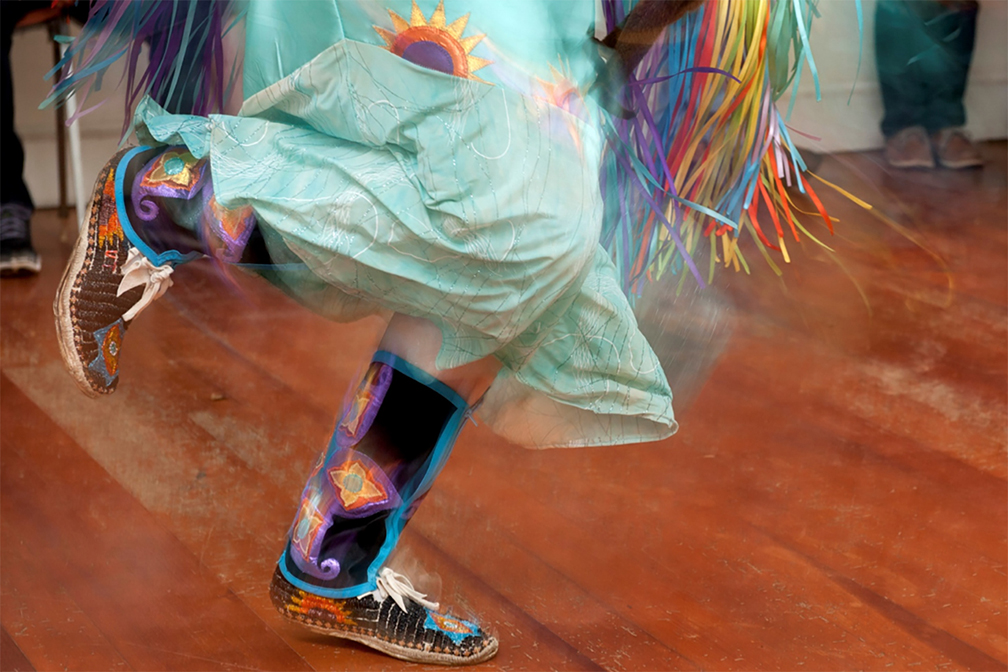Students Organize the University’s First Powwow
April 5, 2017

A small yet dedicated group of individuals — including several College of Liberal Arts and Human Sciences students — organized the university’s first powwow, which took place on April 1 on the Graduate Life Center lawn.
The intertribal powwow opened with a prayer offered by renowned scholar Henrietta Mann, the founding president of the Cheyenne and Arapaho Tribal College.
The powwow followed the recent Virginia Tribal Summit hosted by the Virginia Tech Office of the President for the purpose of reinvigorating partnerships between the university and the commonwealth’s 11 recognized tribes.
The event offered the campus and local community an opportunity to learn more about indigenous cultures. In particular, both the summit and the powwow offered acknowledgment of the Tutelo/Monacan people, who are the traditional custodians of the land, water, and air that Virginia Tech consumes.
Native at Virginia Tech, a registered student organization, is committed to advancing the visibility of American Indians and other indigenous peoples on campus, as well as raising awareness of the issues that confront these diverse populations. A Native American powwow is a ceremonial time of renewal and a way for indigenous people to honor a spiritual connection to their ancestors. It is a gathering to socialize, dance, pray, and celebrate, but where each tribe or individual ascribes personalized meaning.
Organizers of Virginia Tech’s inaugural powwow sought to increase visibility of indigenous students at Virginia Tech, offer awareness of an existing community to students already enrolled, and create a draw for prospective indigenous students. Moreover, organizers wanted to share their culture while educating the campus and Blacksburg communities.
“This powwow is important because it not only creates visibility of native students on campus, but gives current and prospective native students a way to engage beyond academics,” said Doris Brown, of Stafford, Virginia, a sophomore majoring in international studies and French in the College of Liberal Arts and Human Sciences, in advance of the powwow. ”A great deal of planning goes into this, and we have all worked hard together. I hope this powwow is successful so that the university continues to be supportive in years to come, and we can see an increase in native students on Tech’s campus.”
And while this traditional ceremony is a beautiful experience, Brown added, it’s important that attendees understand the sacredness of this ritual.
“Cultural appropriation is not okay,” said Brown. “Native regalia should not be mimicked in costume. Most Native Americans don’t have the honor of wearing a headdress, as it is bestowed upon them by their community in recognition of something they have done. Unfortunately, music festivals like Coachella have made it ‘fashionable.’ We want to share our culture and educate at the same time.”
In addition to Native at Virginia Tech, sponsors of the inaugural powwow included the Student Budget Board, the Division of Student Affairs, the Intercultural Engagement Center, the American Indian and Indigenous Alliance, the American Indian Studies Program, the American Indian and Indigenous Community Center, the Department of Psychology, the College of Engineering, University Libraries, the School of Performing Arts, the Graduate School at Virginia Tech, the Multicultural Academic Opportunities Program, the Department of Religion and Culture, the Department of Marketing, the Department of Management, the Department of Sociology, the College of Agricultural and Life Sciences Diversity Council, and the Virginia Tech Alumni Association.
Written by Hunter Q. Gresham





